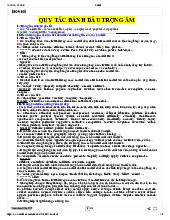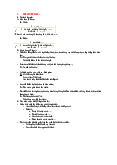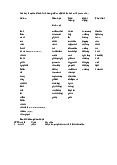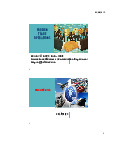



Preview text:
BRITISH LITERATURE TEST
I. Multiple choices (4 points): Choose the best answer for each of the following questions.
1. The Passionate Shepherd to His Love is an example of pastoral lyric. What is pastoral lyrie?
A. poetry that expresses pleasures in a wild setting
B. poetry that expresses emotion in an idyllic setting
C. poetry that expresses urban sentiment with practical ideas
2. What is the tone of the poem The Passionate Shepherd to His Love?
A. passionate and romantic B. practical and distrustful C. dreamy and sad
3. What does the poem The Passionate Shepherd to His Love typify?
A. a romantic love between a swain and a nymph
B. the lyrical ballads in the British literature
C. the courtship in the Elizabethan age in an idyllic setting
4. According to the shepherd in The Passionate Shepherd to His Love, if his
beloved agrees, what pleasure will await them?
A, a big and prosperous family B, a scenario of wealth and power
C. simple delights from nature
5. How does the nymph in Raleigh's poem begin her reply to the shepherd? A, a subjunctive B. a direct rejection C. a real condition
6. What is the significance of the line "A honey tongue, a heart of gall" in the nymph's implication?
A. sweet words may hurt one's heart
B. sweet words may hide impudent behavior. C. honey may kill flies.
7. What effect is the repetition of the word "soon" in line: "Soon break, soon
wither, soon forgotten” according to the nymph in Raleigh's poem?
A. to emphasize the futility of love
B. to emphasize the transience of life
C. to criticize the impermanence of floral beauty in spring
8. What does the nymph in Raleigh's poem long for in her last subjunctive?
A. eternal youth, endless love, and ever-lasting joy
B. wealthy life, longevity, and power
C. timeless beauty, endless love, and eternal youth
9. What is the metrical form of all Shakespearean sonnets? A. Iambic trimeter B. Iambic tetrameter C. lambic pentameter
10. In sonnet 18 by Shakespeare, "the eye of heaven" refers to: A. the sky B. the sun C. the moon
11. In sonnet 18, what is the negative quality of beautiful things according to the poet?
A. they will grow old and die.
B. they will diminish their value by chance.
C. they will lose their initial attractiveness by time.
12. In sonnet 18, "When in eternal lines to time thou growest" means:
A. her beauty will be more broadly-known in this poem over time.
B. she will die and go to Heaven.
C. people will know her because of her beauty.
13. What proof did the poet offer for his assertion that his beloved's "eternal summer shall not fade"?
A. the poet's love will prevent her form dying.
B. death will not brag after she dies.
C. this sonnet will immortalize her beauty over time.
14. In sonnet 29, what does Shakespeare mean when he says "Desiring this
man's art, and that man's scope "?
A. he appreciates the artworks from other men.
B. He wishes to have talents and opportunities like other men.
C. He desires to own art and knowledge of other men.
15. In lines, "Haply I think on thee-and then my state / Like to the lark at break
of day arising" (Sonnet 29). What does the word "state" mean? A. mood B. position C. situation
16. In lines, "Like to the lark at break of day arising
From sullen earth, sings hymns at heaven's gate; " (Sonnet 29)
What is the significance of "sullen earth" according to the poet? A. His present mood B. his previous days C. His previous plight
17. What does Elizabeth want to do when she opened Sonnet 43 with the
question "How do I love thee?"
A. to compile the reasons why she loves her husband
B. to show the ways how her love for husband can be expressed
C. to explain how she is deep in love
18. What does the poet imply in lines: "I love thee to the level of every day's/
Most quiet need, by sun and candle-light."
A. Her love for her husband is so brilliant like the sun and candle-light.
B. Her love for her husband is humble but so essential for her everyday life.
C. Her love for her husband is persistent by day and by night.
19. What does Elizabeth imply in line 7 from Sonnet 43, "I love thee freely, as men strive for right"?
A. Her love is freely given as humans are willing to achieve truth, good and beauty.
B. Her love is beyond any righteousness that humans strive for.
C. She loves her husband with the aspiration for righteousness.
20. What is the change in idea from the octave to the sestet in sonnet 43 by Elizabeth?
A. from the poet's intensity of love at present to her griefs in the past
B. from the poet's previous misfortune to her present happiness
C. from the poet's confession in love to her gratitude to her husband
II. True/False (2 points) Decide whether each of these statements is true (T) or false (F) F
1. Tone in the poem The Nymph's Reply to the Shepherd is passionate and sweet.
2. "The shepherd's tongue" in line: "And truth in every Shepherd's tongue" is a
metonymy for the shepherd's words. F
3. The shepherd in Christopher Marlowe's poem is very practical, rational and opportunistic.
4. The rhyme scheme in all English sonnets is [abab cdcd efef gg]
5. In sonnet 18 by Shakespeare, "Thy eternal summer" is a metaphor.
6. Theme of Sonnet 18 by Shakespeare is about the eternity of poetry.
7. The line: "All the perfume of Arabia will not sweeten this little hand" by
Macbeth is the most ironic lament in Act V, scene 1 of the tragedy Macbeth.
8. In line: "Tomorrow, and tomorrow, and tomorrow, Creeps in this petty pace
from day to day" (Macbeth: Act V, scene 5) "Tomorrow" is the synecdoche for Macbeth's future.
9. In line "Out, out, brief candle!" (Macbeth: Act V, scene 5), "brief candle" is a
metaphor for the permanence of human life.
10. The line: "Fair is foul and foul is fair" (Macbeth: Act I, scene 1) is a
foreshadow which foretells the confusion between good and evil.




